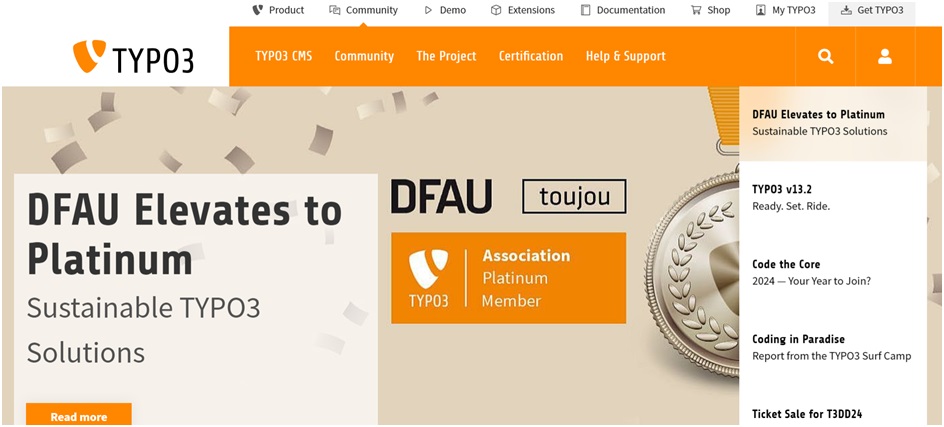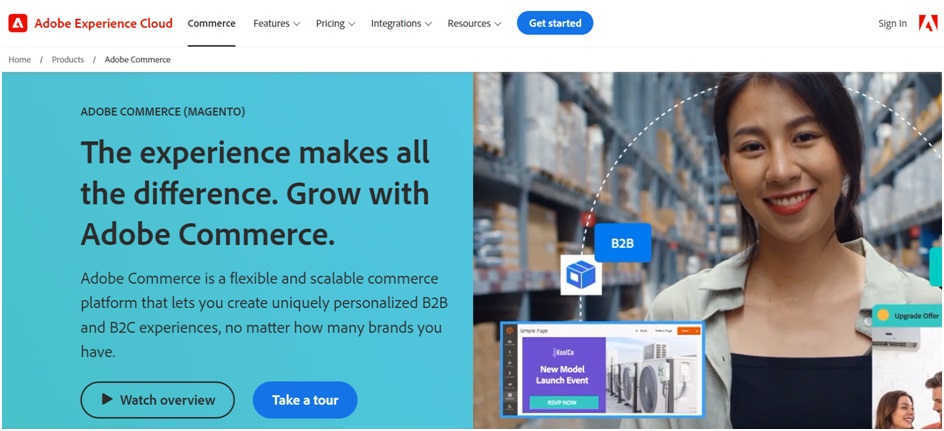Did you know that 43.6% of websites use a custom content management system (CMS)? CMS has become a necessity. According to a recent report, the market for CMS will reach $123 billion by 2026. This stat clearly depicts the rising popularity of the system in modern times.
Many large firms, with their complex workflows and vast content requirements, recognize the vital role of content management in their brand’s success. CMS gives you complete control over your website, enabling easy content management and seamless website creation without any coding knowledge.
However, with thousands of CMS solutions in the market, finding the right one that suits your specific requirements can be daunting. In this blog, we will guide you through the top providers of CMS in 2024 to help you make informed decisions. Let’s get started!
A Content Management System (CMS) is software that helps you to create and modify digital content, including text, video, audio, and infographics for a website, even in the absence of coding knowledge. The CMS platform makes it easy to create and upload content, thanks to its wide selection of themes and templates. CMS handles challenging technical processes for you. Therefore, instead of spending your time creating web pages, you can focus on the core parts of growing your business.
Before going through the best CMS platforms for your business, let's go through the various types of CMS. CMS is usually categorized into five types with unique functions and capabilities. They include:
-
Web Content Management System
WCMS is useful for online content like product manuals and user guides. It allows users to customize the components and workflows of the site even in the absence of a programming background.
-
Component Content Management System
CCMS stores all content in a central hub that users can access when they need to publish content for mobile, web, and print. If users want to change any details, they need to revise once to update every file that has the specific text. It manages content at a granular level.
-
Document Management System
DMS is a software designed to store, organize, and manage electronic documents. Businesses, government agencies, and educational institutions prominently use DMS in various settings.
-
Enterprise Content Management
ECM is ideal for companies of all sizes. ECM platform can collect, organize, and deliver documents to help the management and employees make decisions.
-
Digital Asset Management
The DAM system has a centralized library where users can easily access documents and other crucial files through the cloud. Only authorized users will have access, and they can publish their content on various social platforms or third-party distribution services using the DAM system.
Looking for the best CMS platform for your business? We have researched and reviewed a list of the top 8 content management systems to try in 2024. Read on!
1. Joomla

Joomla is the best CMS (Content Management System) provider for building dynamic websites and robust online programs. It offers an easy-to-use and intuitive interface, great customization features, and a tremendous library of extensions. Joomla's endless functionalities make it a versatile choice for diverse website types. It is an open-source program that lets you create, manage, and publicize digital content via a single platform.
Oxtrys offers dedicated Joomla hosting at cost-effective rates. With SSD storage, a wide range of operating systems (Windows, Ubuntu, Fedora, Alma Linux), extensive bandwidth, and RAM, Oxtrys has data centers in prominent locations worldwide to guarantee 99.99% uptime. Our dedicated servers promise seamless functioning and robust performance. We offer root access and DDoS protection and do not charge any set-up fees.
Key features
-
Joomla is packed with a wide range of features, including drag-and-drop easy content editing, SEO optimization, and multilingual support.
-
Extendable and customizable with over 8000 extensions available in the in-house library.
-
Steeper learning curve to set up, but the editor is simple to use.
2. WordPress

WordPress is one of the leading open-source CMS platforms. They have more than 10,000 free themes or templates with over 60,000 free plugins. Getting the latest version of plugins will reduce the vulnerabilities in the website, exposing the data to hackers. Their CMS also drives you to generate mobile-responsive websites. WordPress can generate title tags and meta descriptions automatically for your posts and pages.
Key features
-
Has a large community of users across the world to ensure seamless and timely support
-
Intuitive and easy-to-navigate interface
-
There is a plethora of plugins to build a website without any coding knowledge.
3. Drupal

Drupal is an another flexible open-source CMS software. Drupal has a narrow audience and primarily targets developers, marketers, and agencies. The platform handles custom websites with large data or heavy traffic volumes. To make the most of the platforms, it is important to be skilled in PHP, HTML, and CSS, among other coding languages.
Key features
-
Great performance for data-heavy websites
-
Best reputation for security features among open-source software
-
Wide selection of customizable modules and themes
4. TYPO3

TYPO3 CMS is an open-source CMS platform for enterprise web applications. With its high-end infrastructure, TYPO3 emphasizes security features for different industries and organizations. The scalable feature of the CMS grows as your organization. The interface of TYPO3 is quite user-friendly and built to handle massive volumes of content and digital assets. It also has outstanding customer support to help you with daily tasks like content planning, modeling, and even asset management.
Key features
-
Intuitive multi-site features to support campaigns
-
Support massive international web projects with multilingual content structures
-
6000 extensions are available in the TYPO3 repository
5. Magento or Abode Commerce

Magento is one of the best eCommerce platforms in the market. Its CMS software focuses on better security, SEO, and customization to optimize almost every type of eCommerce site. Magento caters to the needs of bigger online stores, and the platform has solid features to handle a high number of products and orders. With Magento, you can showcase products virtually using inventory management, including dynamic pricing and immediate product creation.
Key features
-
Management of multiple stores in various locations, using different currencies and languages
-
Content management is made responsive across mobile devices
-
Secure payment gateway and touch-service features
6. Shopify

Shopify is undoubtedly a leading CMS for eCommerce businesses. It is SaaS-hosted, has a simple interface, and integrates with giant brands like eBay and Amazon. The platform has a simple drag-and-drop website builder that is accessible even to non-tech professionals. The CMS solution offers opportunities to include customer reviews, use blogging tools, and apply simple web traffic analysis features. It makes the web store management process as straightforward and seamless as possible.
Key Features
-
There are plenty of themes and extensions to choose from
-
PCI-compliant security features
-
24/7 availability of technical support
As your business begins to break new ground, a Content Management System becomes necessary for sustaining connections and interaction between you and your target audience. The platform you choose should depend on your business operations volume, unique needs, and predefined budget. Make sure to conduct a detailed comparison of different content management systems and their features to choose the right solution.
Oxtrys is your one-stop Joomla hosting company, offering all the services related to custom web solutions under one roof. We even ofer website development services. Our in-house team of experienced developers will assist you in creating tailored websites with user-friendly features and seamless performance. We help you boost the digital presence of your business from scratch, ensuring scalability and long-term success.